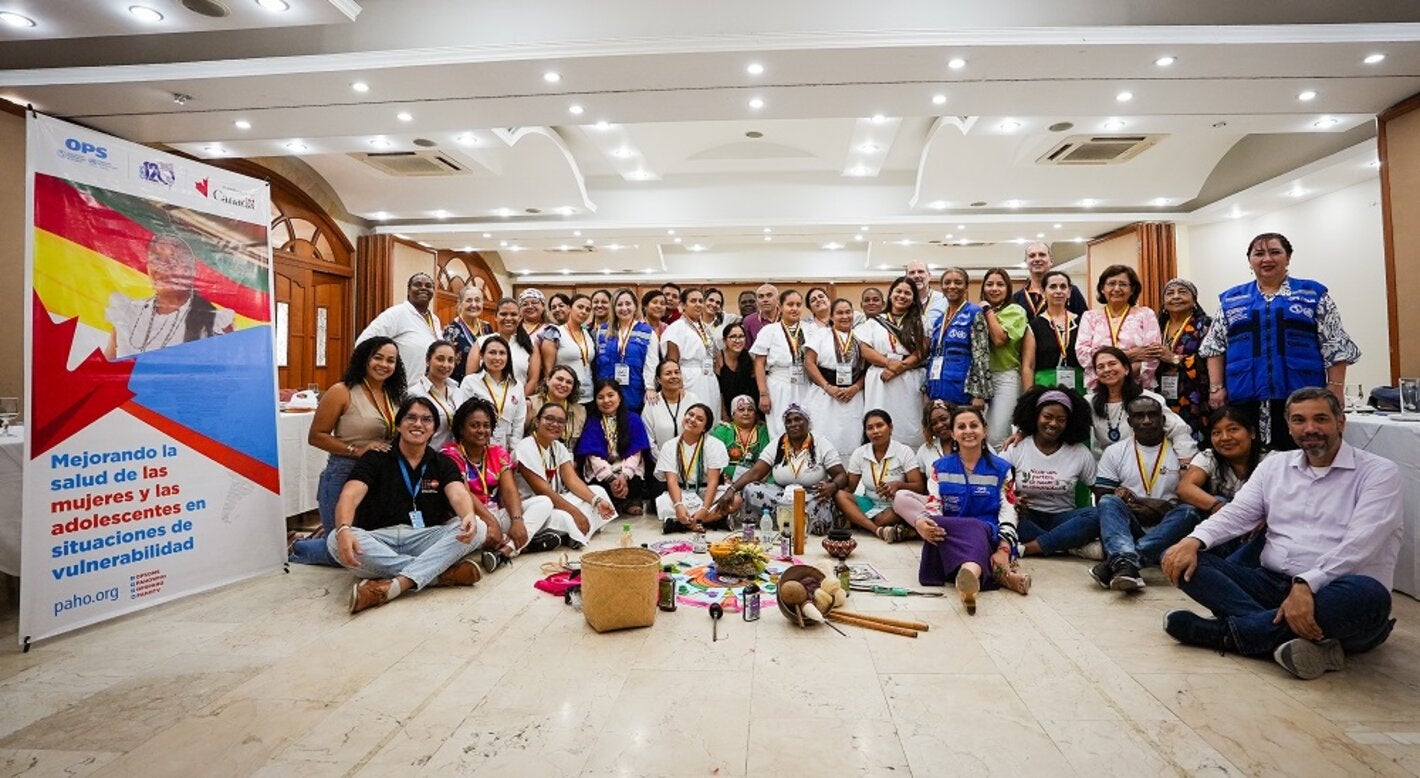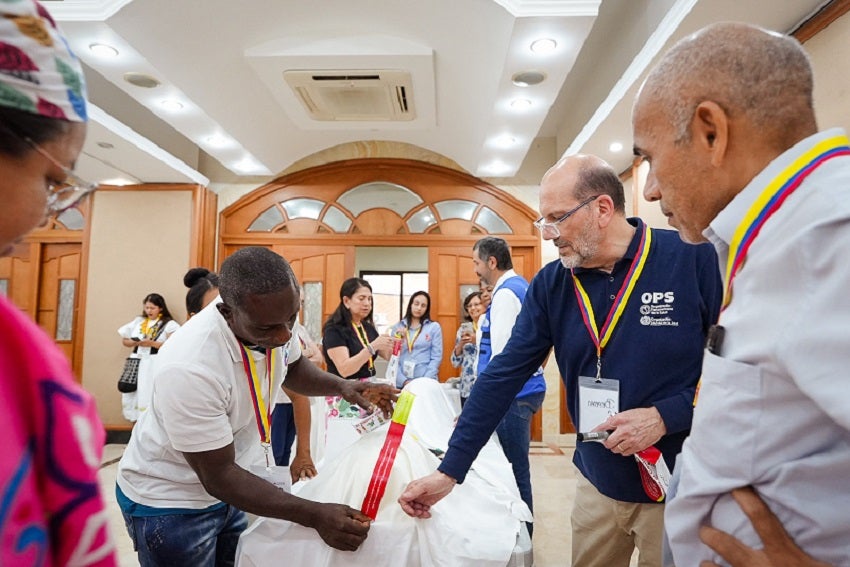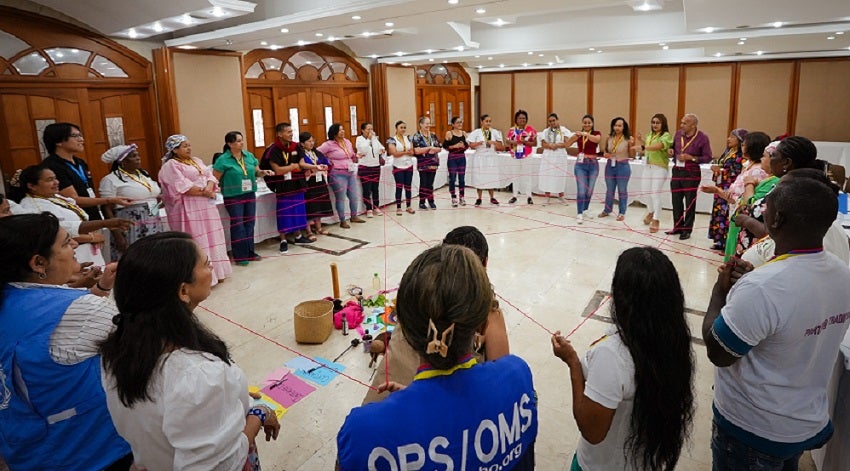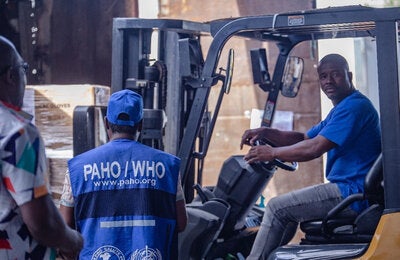
Valledupar, July 26th,2024 - The Pan American Health Organization (PAHO) and its Latin American Center for Perinatology - Women's Health and Reproductive Health (CLP/WR) successfully concluded the "National Workshop to Train Facilitators in the Use of Community Perinatal Technologies." This two-day event, attended by 30 traditional midwives from various ethnicities and regions of the country, aimed to improve maternal care capacities in rural and hard-to-reach communities in Colombia. The workshop was held on July 23 and 24, in Valledupar, Cesar.
The primary objective was to train facilitators to replicate the knowledge acquired in their communities to reduce maternal morbidity and mortality in regions where access to health services is limited. Besides traditional midwives, other community workers and health personnel from different levels participated.
During the sessions, participants received training in various areas, such as prenatal care, identification of risk signs, and initial management of obstetric emergencies. They were trained in the use of community perinatal technologies, including the use of the Non-Pneumatic Anti-Shock Garment (NASG) and blood pressure measurement to detect hypertensive disorders. These technologies help anticipate risks in home deliveries and were designed to be easily interpreted, even by those with reading or writing difficulties.
Practical sessions were also held to recognize signs of infection and sepsis and measure body temperature and oxygen saturation. Additionally, training was provided on using scales to calculate the weight of pregnant women and newborns, as well as measuring anthropometric data. Each participant received a kit with all these tools and community technologies, contributing to the strengthening of community response and timely referral to health services.
“This training mainly complements the work we have been doing as midwives. Reinforcing knowledge and unifying skills and traditions help safeguard women's lives,” said Luz Stella Polo Valencia, coordinator of midwives and apprentices of the Association of United Midwives of the Pacific.
The event was supported by Global Affairs Canada through the project "Improved Health of Women and Adolescent Girls in Situations of Vulnerability." Through practical exercises and the knowledge dialogue methodology, an intercultural approach and exchange among participants were promoted, emphasizing the importance of building strong community networks for comprehensive and respectful care of pregnant women.
“Here, there are people from different ethnicities and cultures, with their own community processes. This space, through respect and dialogue, allows for the exchange of practices and encourages more people to commit to the health of their communities,” said Carlos Silvia, a nursing assistant at the Mama Dominga Hospital in the department of Cauca, Colombia.
The event included participation from UNFPA and national entities such as the Ministry of Health, the National Institute of Health, and the National Administrative Department of Statistics, demonstrating the current interest and priority in the country to advance the involvement of community agents and traditional medicine in the sociocultural adaptation of health services, as well as enhancing family and community capacities for the care of pregnant women, girls, and boys in the territories.
Strategy to Accelerate the Reduction of Maternal Mortality
The regional advisor on Maternal Health, Dr. Bremen De Mucio, expressed that this action is part of a regional plan and aligns with the Strategy to Accelerate the Reduction of Maternal Mortality in the Americas, recently presented by the PAHO director, Dr. Jarbas Barbosa. The strategy is based on Primary Health Care and includes six priority lines that countries can adapt according to their specific contexts and needs.
De Mucio explained that PAHO decided to prioritize 12 countries based on two criteria: countries with the highest Maternal Mortality Ratio and countries with the highest absolute numbers of maternal mortality. “Colombia is among the prioritized countries because, like Mexico and Brazil, its population size strongly impacts regional maternal mortality,” he explained.
This workshop is one of the tools available to improve the care of mothers and children during the prenatal period and childbirth and to provide timely responses to major obstetric emergencies. “There are instruments and techniques that allow us to buy time, which is crucial for saving lives when it comes to women in isolated areas with limited access to health services,” said De Mucio.
PAHO, in collaboration with the Ministry of Health of Colombia, continues efforts to implement strategies that contribute to reducing inequalities in access to quality health services. This workshop represents a significant step towards achieving the goals set in the United Nations' 2030 Agenda for Sustainable Development Goals and contributes to strengthening networks for the care of pregnant women, girls, and boys from the community level and within the framework of intercultural and gender perspectives.
The event concluded with an evaluation of the workshop and the planning of future implementation actions at the territorial level, reaffirming the commitment of the participating institutions to continue working on reducing maternal mortality in Colombia
“I leave here strengthened. I am happy. I acquired many knowledge that I will share with my community. I am where I need to be to help my people,” concluded Cenaida Pana, a midwife from the La Guajira region.





